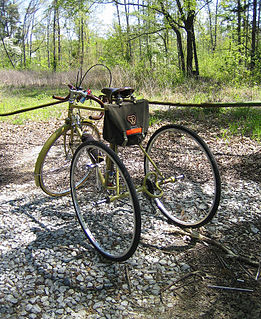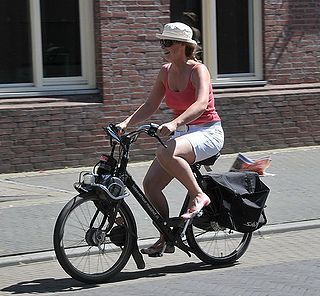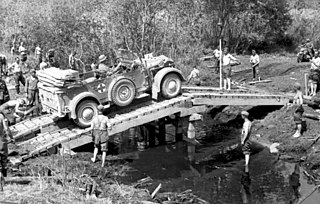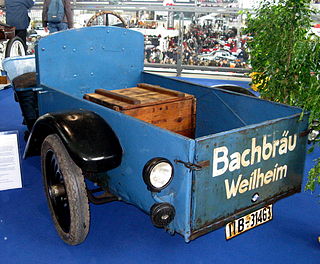
The Volkswagen Type 82 Kübelwagen, or simply Kübel, contractions of the original German word Kübelsitzwagen, is a light military vehicle designed by Ferdinand Porsche and built by Volkswagen during World War II for use by the Nazi German military. Based heavily on the Volkswagen Beetle, it was prototyped and first deployed in Poland as the Type 62, but following improvements entered full-scale production as the Type 82. Several derivative models, such as the Kommandeurswagen, were also built in hundreds, or in dozens.

Stoewer was a German automobile manufacturer before World War II whose headquarters were in Stettin.

A tricycle, sometimes abbreviated to trike, is a human-powered three-wheeled vehicle.

In mechanical or automotive engineering, a freewheel or overrunning clutch is a device in a transmission that disengages the driveshaft from the driven shaft when the driven shaft rotates faster than the driveshaft. An overdrive is sometimes mistakenly called a freewheel, but is otherwise unrelated.

Front-wheel drive (FWD) is a form of engine and transmission layout used in motor vehicles, where the engine drives the front wheels only. Most modern front-wheel-drive vehicles feature a transverse engine, rather than the conventional longitudinal engine arrangement generally found in rear-wheel-drive and four-wheel drive vehicles.

Gutbrod was a German manufacturer of cars, motorcycles and small agricultural machinery. The firm was founded in Ludwigsburg, Germany by Wilhelm Gutbrod in 1926. It originally built "Standard" branded motorcycles. In 1933 the company relocated to the nearby Stuttgart suburb of Feuerbach, and from 1933 to 1935, Standard Superior cars were built with rear-mounted engines.

De Dion-Bouton was a French automobile manufacturer and railcar manufacturer operating from 1883 to 1953. The company was founded by the Marquis Jules-Albert de Dion, Georges Bouton, and Bouton's brother-in-law Charles Trépardoux.

A motorized bicycle is a bicycle with an attached motor or engine and transmission used either to power the vehicle unassisted, or to assist with pedalling. Since it sometimes retains both pedals and a discrete connected drive for rider-powered propulsion, the motorized bicycle is in technical terms a true bicycle, albeit a power-assisted one. Typically they are incapable of speeds above 52km/h.
Goliath-Werke Borgward & Co. was a German car manufacturer started by Carl F. W. Borgward and Wilhelm Tecklenborg in 1928, and was part of the Borgward group. Goliath was based in Bremen and specialized in three-wheeler cars and trucks and medium-sized cars. Their vehicles were sold under the Goliath brand.

Tempo, was a German automobile manufacturer based in Hamburg. The company was founded by Oscar Vidal in 1924.

Einheits-Pkw der Wehrmacht – literally: "standard passenger motor-car of the Wehrmacht" – was the Nazi German plan for a new, multi-purpose fleet of four-wheel drive, off-road capable cars and light trucks, based on just three uniform chassis, specifically designed and built for the Wehrmacht, formulated in 1934, and built from 1936 to 1943.

The Moto Guzzi Triporteurs were wheeled transport motorcycles (triporteurs) of the Moto Guzzi brand. In Italy, they were called "Moto Carri".

Dennis Brothers Limited was an English manufacturer of commercial vehicles based in Guildford. It is best remembered as a manufacturer of buses, fire engines and lorries (trucks) and municipal vehicles such as dustcarts. All vehicles were made to order to the customer's requirements and more strongly built than mass production equivalents. Dennis Brothers was Guildford's main employer.

The Goliath F400 is a three-wheeled pickup transporter, made by Hansa-Lloyd and Goliath Company Borgward & Tecklenborg in Bremen, Germany which was sold under the brand Goliath. It was based on the three-wheeled passenger car Goliath Pionier with a closed timber-framed wood cab.

The Gutbrod Superior is a small car, built from 1950 until 1954 by German manufacturer Gutbrod. A total of 6,860 cabriolet saloons and 866 estates were built in less than four years.

The Goliath GD750 was a three-wheeler pickup truck built by the Goliath division of the Borgward Group in Bremen from April 1949 to 1955 in various body variants. In the early 1950s, low-cost vans were popular with small craft businesses. In 1949, the purchase price for flatbed variant was DM 3600. In total, 30,093 units of the GD750 were built. In 1950 and 1951, a huge quantity of vehicles were built, 8468 and 7136 units respectively. The number 750 in the type designation indicated the possible payload of 750 kg.

The Goliath Rapid is a lorry made by Bremer Kühlerfabrik Borgward & Co. GmbH in Sebaldsbrück. The Rapid, which technically was an improved version of the Goliath Blitzkarren, was sold under the Goliath brand name. Bordward's radiator-producing company was later renamed to Goliath-Werke Borgward & Co. GmbH.

The BMW F 76 was a small tricycle delivery van made by BMW. It was built from 1932 to 1933 in BMW's Eisenach plant. In 1933, the BMW F 79 version with a larger engine was put into production.
The Standard P503 was a three-wheeler light freight truck, produced from 1935 to 1939 by Wilhelm Gutbrods Standard Werkzeugfabrik, Germany.

RGW-Auto was a joint project for the construction of passenger cars in the former East Germany and Czechoslovakia. Both countries were members of Comecon. The aging Trabant 601, Wartburg 353, Škoda 100 and Dacia 1300 were to be replaced by vehicles with a modern design. The manufacturers involved were Automobilwerk Eisenach (Wartburg), Sachsenring Automobilwerke Zwickau (Trabant), AZNP Mladá Boleslav (Škoda) and Uzina de Autoturisme Pitești (Dacia). Mass production of the ambitious project was to begin in 1978, but it never happened.


















